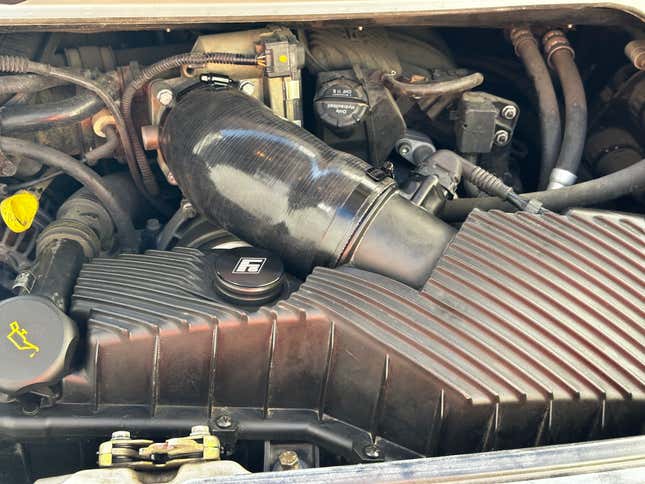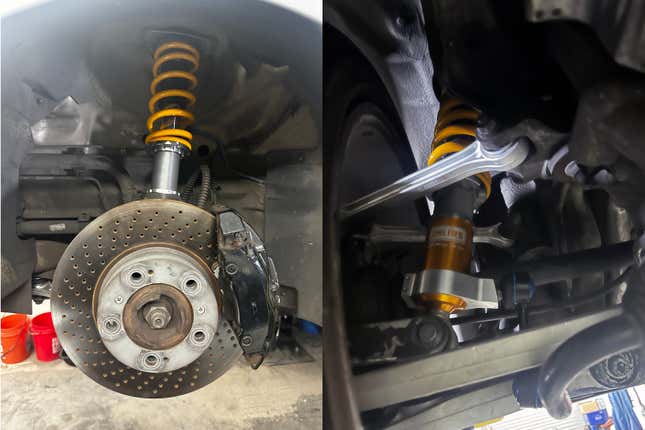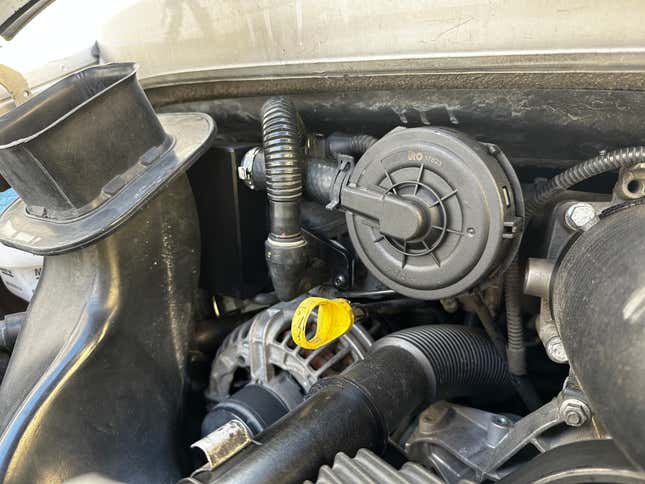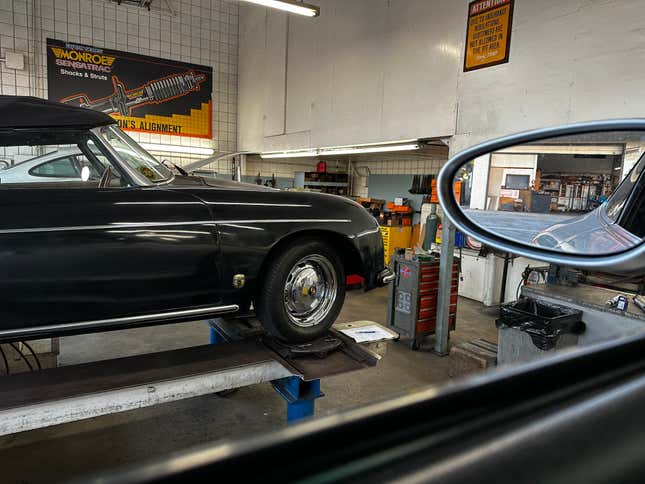Owning a Porsche – new or old – is expensive. Parts are expensive. Shop labor is expensive. Now that I’m the owner of a new-to-me, cheap-ish 911, I’m determined to keep costs down without sacrificing the quality of parts on my car. This means doing some wrenching myself, and my results thus far have been mixed but mostly good.
If it’s Worth Doing, It’s Worth Doing Twice
During my PPI inspection, one of the things I learned was that my window regulator was on its way out and that it would need to be replaced. After seeking out some DIY videos and some DIY articles (thanks to my former employer, Pelican Parts), I figured I’d roll the dice and try to fix it myself, and as it turns out, this was a pretty easy way to get into working on my 911.
Despite all the bad things people love to say about the 996 generation 911, it’s pretty easy to work on. Despite my limited wrenching experience, I completed this job – the first time – in about an hour. The toughest part was removing the foam vapor barrier, which had been on the car since new. The glue that held it on was recalcitrant, to say the least.
Now, I say “the first time” because there’s a little “gotcha” in the window regulator that comes from the 911 sharing with the Boxster. A little window stop screw comes installed on all the regulator assemblies, and it’s not used for the 911. If it’s left in place, the window won’t roll all the way down, and guess when I found out that I’d forgotten about that screw? That’s right, when I’d put the door all back together. Still, even with my mistake, this was an easy repair and saved me around $600 in labor, all told.
Next, I decided to tackle my wonky sunroof. The PPI said that my switch was broken, so that’s where I started. I ordered a new switch for around $40 and the surround for $120. I picked these up from Sunset Porsche Parts, a Porsche dealer in Oregon with a huge online parts sales business. They regularly offer the best prices for hard-to-get genuine Porsche parts, and I use them a lot.
Unfortunately, the switch didn’t fix my issue, so I took to online forums to find a solution. One of the best parts of 996 ownership is that there’s a huge online community of people doing DIY fixes. The knowledge base on sites like Rennlist.com or 6SpeedOnline.com makes finding answers to problems easy. In my search, I discovered that my issue was likely the motor control unit for the sunroof. This is attached to the motor itself, and removing the motor and controller is a super easy 15-minute job. The motor controller is in charge of all of the one-touch controls for the sunroof, and my specific issue is that it was getting confused as to which button function was which, and it wouldn’t retain its memory.
The fix for this was easy, too. Either I could spend $700 on a new motor and controller from Porsche or take a chance on a used one. I went the latter route, and for $200 and around 30 minutes of my time, I now have a fully functional sunroof. Another win.
Just Breathe (Louder)

DIY repairs are all well and good, but what about modifications? I wanted to get a little more sound from my 911 without spending a ton of money or going through a huge rigamarole of wrenching. This is how I found Flat 6 Motorsports and its intake air resonator delete kit. The kit is simple and includes a new elbow to go from your stock intake box to the throttle body, a lovely milled aluminum plug to block off the port on the intake where the resonator box lives and some hose clamps. Installing this took around 20 minutes; add on another 20 minutes to clean my intake box and install a new, washable BMC air filter, which should also add to the sound.
The result of this mod is a seriously pronounced intake honk when you’re really revving the engine out. The sound above 5,000 rpm is sublime, and while it’s no open-element filter like what you get on a GT3, the Flat 6 Motorsports solution gets you most of the way there for less than $100 for the resonator delete kit and around $150 for the air filter. It’s a relatively small investment to give your 911 some extra personality.
Suspension of Disbelief
Now, the big one: the suspension. My car was rolling on mostly original suspension parts, which were pretty tired after around 137,000 miles of wear. My solution was to call up FCP Euro, a company I’ve been shopping with for the better part of 20 years (when they were still called FCP Groton), and get a whole complement of new Meyle and Lemforder suspension components and, most excitingly, a set of Ohlins Road & Track coilovers.
This is a huge job, no matter which way you slice it, so I prepped for it by buying a copy of the Bentley manual for the 996 (a must-have for DIYers), watching a bunch of FCP Euro’s seriously useful and rad DIY videos and then coercing a friend with a lift to let me use his shop for a weekend. Even with all that, this is the biggest job I’ve ever undertaken on a car, and while it very nearly kicked my ass, the results are incredible.
Full Disclosure: FCP Euro provided the stock suspension parts for this project and really nicely gave me their employee discount on the Ohlins Road & Track suspension, while Flat 6 Motorsports provided me with the resonator delete kit and BMC filter. I’d have bought this stuff from them anyway, but I appreciate the hell out of them for supporting the 996 project. They’re both enthusiast owned and run, and you should support them.
One of the cool things about the 996 platform is that it uses many of the same suspension components in the front and the back. For example, the lower control arms are the same at all four corners. That makes ordering parts a lot easier). It also means that you’re mostly using the same tools and techniques for the job all the way around. I’m lucky that my car has been a California car its whole life, so I didn’t have to deal with galvanic corrosion or rust on the suspension bolts. That means that, while things were pretty stubborn just by virtue of being on this car for 20 years, they weren’t destroyed or difficult to get off with the right tools.

The Ohlins Road & Track coilovers are more of a mixed bag than the stock suspension components. Some of the decisions Ohlins made for this kit, in terms of assembly, were bad, and made the process harder than it needed to be. The biggest example of this was the top nut for the rear coilovers. Rather than using a hex or a Torx to counterhold the shock shaft, it has a slightly-too-wide-for-a-flat-screwdriver slot. This resulted in a somewhat chewed-up shaft end and a broken trim popper tool that was the only thing wide enough to bridge that gap. That said, this was my first coilover install, and I didn’t really get stuck at any point, so it wasn’t too bad. The setup and assembly process mostly required a lot of measuring and reusing some factory parts, namely four cupped washers that Porsche wants $50 for – each – should you opt for new ones. Oh, and the assembly instructions included in the box with the Ohlins are wrong, which you wouldn’t know unless you looked up forum posts. There are updated instructions on Ohlins’ website.
As the various videos and books suggested, I marked my suspension’s alignment settings with a paint pen to put it back close enough to original to get to an alignment shop. Friends, I somehow managed to screw this up, and my car was utterly terrifying to drive home from my friend’s shop. It was so bad that my car nearly spun when hitting a damp tar snake at around 35 mph. I caught it, but it was close. Needless to say, I made an appointment to get an alignment as soon as possible.
Fixing Porsche’s Engineering
But before that could happen, I had to bring the car back to Auto Werkstatt – where I had the PPI done – for some work that I wasn’t ready to try on my own. Specifically, I needed help with the replacement of the 911's notorious air-oil separator, which lives deep in the tiny engine bay and is a 10-hour job for a mechanic to do. Rather than replace my broken AOS with the flawed stock unit, I decided to try a different approach. A former Porsche mechanic on Rennlist invented a really cool replacement for the stock-style unit, and he calls it the Ultimate Air Oil Separator.
The UAOS is rad in a few ways. First, it separates the part of the stock AOS that fails and moves it to the front of the engine compartment, making replacing it a 10-minute job when it fails. The other thing this mechanic did was add an oil accumulator tank that catches the oil, which would otherwise get sent back into the intake, and lets you drain it out at your oil change. Even cooler is that the UAOS includes an optical sensor in that tank that will let you know when it’s full by slow-flashing your coolant light. The best bit is that all this is only a little more expensive than the stock replacement parts. As to how well it will work and how long it’ll last? We’ll see. Plenty of people on the forums have had good experiences, but I don’t mind being a guinea pig since the job had to be done anyway.

While the car was in the shop, I also had them replace my oil filler tube, which on the 996 is a flexible plastic tube that can crack with age and present a vacuum leak. Doing the job usually requires removing the car’s alternator, but since they would be disassembling most of the top of the engine anyway, it made sense for the shop to do that. The same was true for a set of performance semi-solid engine mounts, which I picked up used for cheap on Rennlist.
These engine mounts, which are made of milled aluminum and a soft-ish polyurethane bushing, limit the flat-six engine’s movement, which has the most notable effect of increasing the feeling of accuracy for the car’s manual shifter. It also makes the car a little buzzier and noisier, but it’s a sports car, so I don’t mind. One thing that’s cool is that I now can feel when the car changes its cam profiles (kind of like VTEC, but Porsche calls it VarioCam Plus, and my changeover happens around 3,500 rpm).
Getting Straightened Out
Last but certainly not least, the car had its date with an alignment shop. The shop I used – Johnson’s Alignment in Torrance, California – is known for doing some seriously high-dollar Porsche street cars and race cars, and takes a completely old-school approach. You won’t find any lasers or computers here. The alignments are done over a pit with turntables for the wheels and tape measures. Think string alignment but without the string. I had my car set as close to 996 GT3 stock alignment as possible on my mostly stock suspension to give it some more aggressive turn-in but still keeping it very street-friendly. I also had the shop raise my suspension by 10 millimeters from the stock Ohlins drop of 20 millimeters. This is partly a looks thing, but mostly I don’t want to lunch the underside of my car on my driveway’s steep approach. Lastly, I had the shop corner balance the car with my weight taken into account.

If you don’t know what corner balancing is, it’s basically the process of using a coilover suspension’s adjustability to compensate for the driver’s weight in the car. This makes for a more balanced and predictable car overall, and it’s something that anyone with coilovers should consider, even if it does add some cost to your alignment.
So, what’s the car like to drive after all of this effort? Friends, it’s fucking rad. The suspension is certainly more firm than the tired stock setup, but it handles as well as a new 911 – with better steering. For the cost of parts and labor and busted knuckles, these mods have made my little 911 into a total dream car for me and this is before setting the compression and rebound on the coilovers. After setting all four corners to 11 clicks from full hard, this suspension setup feels like a higher truth. It’s supple on the road but firm enough to be ready to boogie at the drop of a hat.
What’s Next?
As to my next projects for the 911, I have two on the horizon. The first is the fix for the ubiquitous and annoying black foam problem. This issue stems from Porsche’s use of foam on the car’s HVAC blend doors which, after 20 years, has begun to deteriorate and come out of the vents. Eventually, it will lead to the car not having heat. Fixing it can be done in a couple of different ways, but I’ve got a semi-radical plan for taking care of this while I also take care of my next mod: PCCM Plus, aka the direct-from-Porsche infotainment update that adds Apple CarPlay and Android Auto to my 20-year-old car, but does so in a way that doesn’t require any cutting or rewiring, and which looks like it was meant to be there all along.